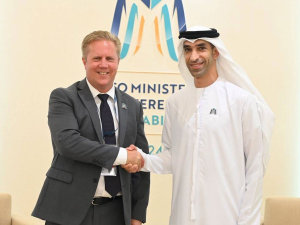ETS costs cut 66% for forest owners – McClay
Additional reductions to costs for forest owners in the Emissions Trading Scheme Registry (ETS) have been announced by the Government.
 The announcement follows formal talks between McClay and his UAE counterpart Minister of State for Foreign Trade Dr Thani bin Ahmed Al Zeyoudi in Wellington.
The announcement follows formal talks between McClay and his UAE counterpart Minister of State for Foreign Trade Dr Thani bin Ahmed Al Zeyoudi in Wellington.
New Zealand farmers are welcoming news of a free trade agreement with the United Arab Emirates, a key country in the Gulf region.
Trade Minister Todd McClay has just announced that New Zealand and the UAE have concluded negotiations on a trade agreement, which will unlock economic opportunities for Kiwi exporters and create stronger supply chains. The announcement follows formal talks between McClay and his UAE counterpart Minister of State for Foreign Trade Dr Thani bin Ahmed Al Zeyoudi in Wellington.
This agreement was concluded in just over four months following the launch of negotiations on 7 May this year, making this New Zealand’s fastest-ever trade agreement negotiation, and the most trade liberalising of any of the UAE’s trade deals to date.
“This shows the Government’s commitment to opening doors and reducing costs and barriers for Kiwi exporters,” McClay says.
“The UAE is a key export destination and hub in the Gulf region. In the year to June 2024, two-way trade was valued at NZ$1.3 billion. The UAE is one of our largest markets in the Middle East, and a top 20 export market overall.”
New Zealand dairy exports to the UAE amounted to $718 million, industrial products $237 million, red meat $46 million, horticulture $44 million, and tourism $31 million.
New Zealand imported $152 million of products and services from the UAE over the same period, including plastics, carpets, travel services and glass.
Before flying to New Zealand Al Zeyoudi was in Australia where he concluded a free trade agreement with his Australian counterpart Don Farrell.
A statement from Farrell’s office says the UAE is an important partner, and Australia's largest trade and investment partner in the Middle East with two-way trade worth A$9.9 billion in 2023.
This trade agreement provides a gateway for Australian exporters to diversify into the Middle East, a market of around 58 million consumers and a combined GDP of A$1.4 trillion.
Key Australian exports to the UAE include alumina, meat, dairy, oil seeds, seafood, steel, canola seeds, nuts, honey, coal, chickpeas, lentils and higher education.
Federated Farmers president Wayne Langford says a trade deal with the UAE is an exciting and positive step forward for New Zealand.
"This is great news for Kiwi farmers who have been doing it pretty tough lately with high costs and squeezed profit margins," Langford says.
"As a country we earn a living producing high quality food and fibre and selling it to the rest of the world, but we’re currently operating in a tough international environment.
"Farmers will gladly welcome any moves to reduce our costs, grow our incomes, or increase our competitiveness in the global marketplace."
The United Arab Emirates is a top 20 export market for New Zealand, and one of our largest markets in the Middle East.
"The Middle East presents an exciting opportunity for Kiwi exporters as a wealthy and growing market with huge potential," Langford says.
"This agreement will take millions of dollars that would have been charged in tariffs and pump them directly into our rural communities.
"It’s great to see the Government delivering on their commitment to open up new markets, reduce tariffs, and give our exporters options."
Norwood has announced the opening of a new Tasman dealership at Richmond near Nelson next month.
Buying or building a rural or semi-rural property? Make sure you know where the wastewater goes, says Environment Canterbury.
With collars on more than seven million cows worldwide, Nedap says its standalone launch into New Zealand represents world-leading, reliable and proven smart technology solutions for dairy farmers.
The Meat Industry Association (MIA) is once again looking for game-changing ideas for New Zealand's red meat processing and exporting sector.
Environment Southland is inviting feedback on two bylaws that play a critical role in safeguarding the region's waterways and ensuring the safety of the local community.
While the North Island is inundated with rain, Southland is facing receding water levels as warm weather and lack of rainfall continues.